Medical Disclaimer: This article is for informational purposes only and does not constitute medical advice. Always consult with your veterinarian for any health concerns regarding your pet. They will be able to perform a physical examination, recommend appropriate diagnostics, and create a treatment plan tailored to your dog’s specific needs.)
Table of Contents
Key Takeaways
Deciding between a fecal PCR test for dogs and a traditional fecal flotation can feel confusing. Here’s what you need to know in a nutshell: The classic fecal flotation is a reliable and cost-effective first step, excellent for finding the eggs of common worms like roundworms and hookworms in routine screenings. The newer fecal PCR test for dogs is a highly sensitive DNA-based test. It’s a game-changer for detecting hard-to-find organisms like Giardia, or for getting to the bottom of persistent diarrhoea when other tests are negative. Your vet’s choice depends entirely on your dog’s symptoms, health history, and the goal of the test, whether it’s a routine check-up or a deep diagnostic dive.
A Vet’s Introduction: That Worrying Sample
There are few things more stressful for a pet owner than seeing your best friend unwell. When the issue is an upset stomach, vomiting, or diarrhoea, the path to an answer often starts with you bringing us a small, humble-looking stool sample. It’s not a glamorous task, but it’s one of the most powerful diagnostic steps we can take.
As a vet here in Ottawa for nearly a decade, I’ve seen the relief on an owner’s face when we finally pinpoint the cause of their dog’s discomfort. The conversation often turns to how we found it. “Was it the regular test? Or that other one you mentioned?” That “other one” is usually the fecal PCR test for dogs, and understanding how it differs from a traditional test is key to feeling confident in your dog’s care.
What Are We Even Looking For? A Quick Guide to Common Canine Intestinal Parasites
Before we dive into the tests themselves, let’s talk about the culprits we’re trying to unmask. A dog’s digestive tract can, unfortunately, become home to a variety of unwelcome guests. These parasites range from multicellular worms to single-celled protozoa, and they all have the potential to cause anything from mild irritation to severe illness.
The most common offenders we look for are detailed in comprehensive resources like the Merck Veterinary Manual’s guide to canine gastrointestinal parasites. They generally fall into a few categories:
- Roundworms: Very common in puppies, often looking like spaghetti in stool or vomit.
- Hookworms: Small worms that “hook” onto the intestinal wall and feed on blood, which can cause anaemia.
- Whipworms: These can cause chronic, watery diarrhea that is sometimes bloody.
- Giardia: A single-celled protozoan that causes the infamous “beaver fever.” It can be notoriously difficult to diagnose.
- Coccidia: Another single-celled organism, often causing watery diarrhoea, especially in young or stressed dogs.
Finding out which, if any, of these is causing the problem is our primary mission.
The Classic Detective: How a Fecal Flotation Works
You can also see: https://doglifeexpert.com/blood-tests-for-dogs-3-essential-screens/
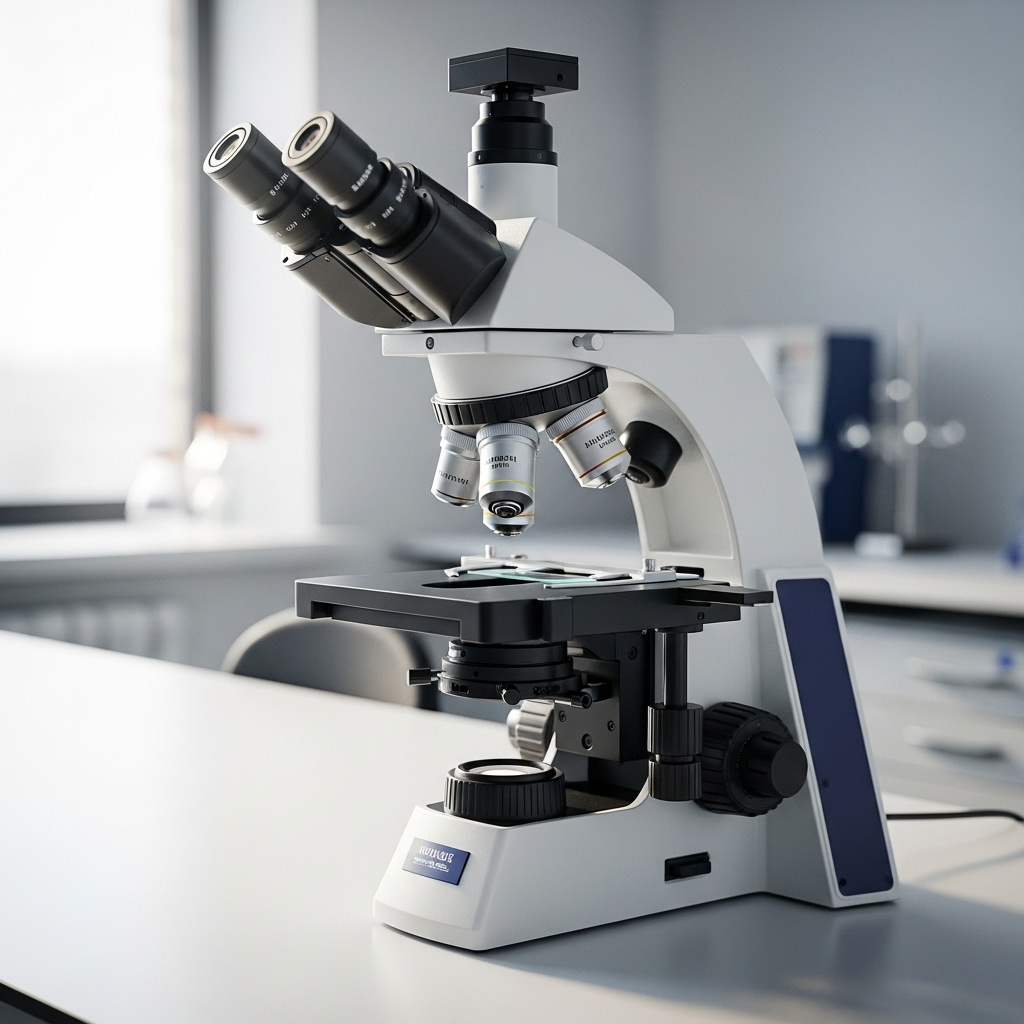
For decades, the fecal flotation has been the gold standard for parasite screening, and for good reason. It’s a reliable, fast, and cost-effective method that we perform right in our clinic’s lab every single day.
The Process: A Look Under the Microscope
The principle behind a fecal flotation is simple but clever. We mix a small amount of your dog’s stool with a special solution that has a high specific gravity. Most parasite eggs are less dense than the solution, so they float to the surface. We then place a microscope slide on top to collect these floating eggs, add a stain, and examine it under the microscope.
It’s a process that has been refined over the years. Foundational research published in the Journal of the American Animal Hospital Association compared different fecal examination techniques, highlighting how methods like centrifugal flotation—spinning the sample to better separate the eggs—can significantly improve the chances of finding parasites compared to a simple smear.
[Image: In-Article Image 1]
ALT Text: A microscope used for a traditional fecal flotation, a common alternative to a fecal PCR test for dogs.
What It’s Great at Finding (And What It Misses)
A well-performed fecal float is fantastic at identifying the eggs of common intestinal worms. I’ll never forget a little pot-bellied Bernedoodle puppy who came in for his first check-up. He seemed happy, but his belly was just a bit too round. A routine fecal flotation showed a classic picture: dozens of roundworm eggs. It was a textbook case, and we got him on dewormer immediately.
However, the fecal float has limitations. It can only find parasites that are actively shedding eggs at that moment. Some parasites have inconsistent shedding cycles. Furthermore, it struggles to identify certain organisms like Giardia, as the cysts can be damaged by the flotation solution and are notoriously difficult to spot. It also can’t identify viruses or bacteria.
The DNA Hunter: Understanding the Fecal PCR Test for Dogs
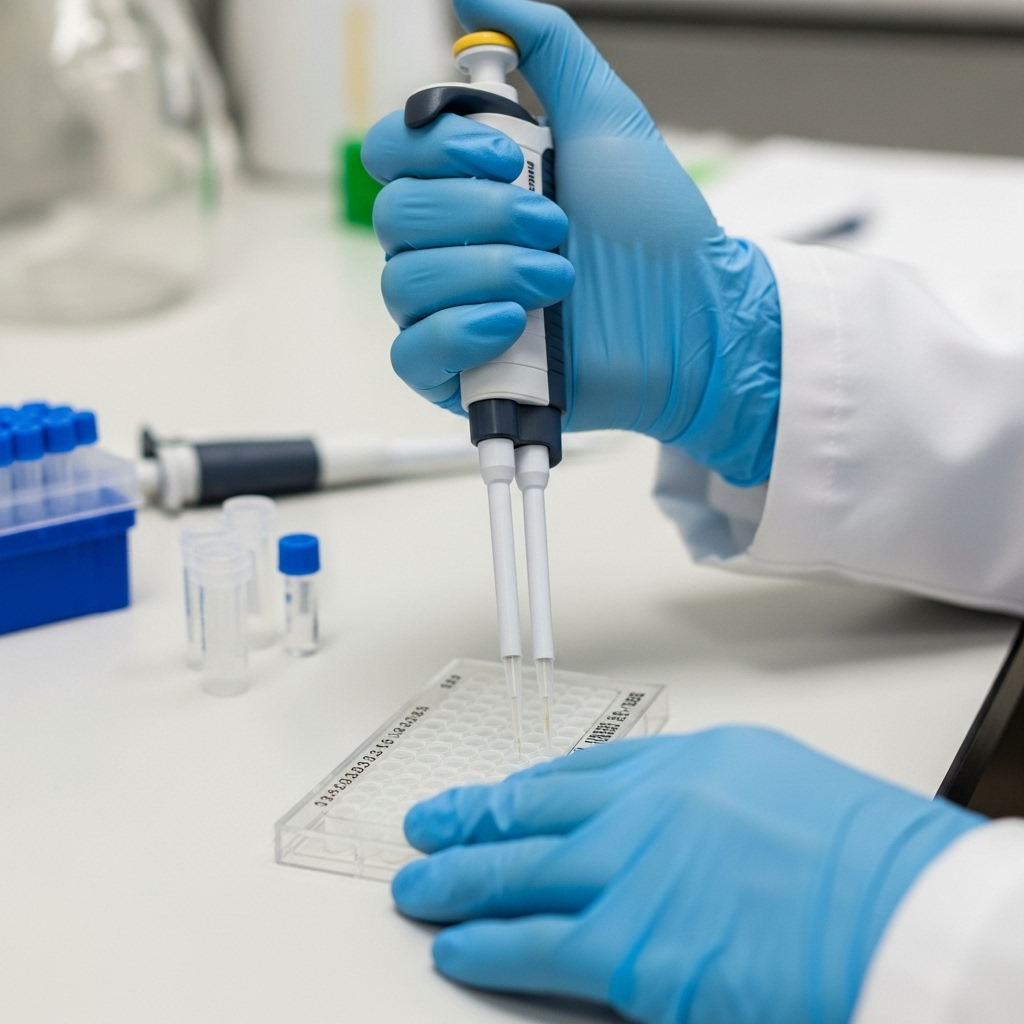
This is where modern technology provides a powerful alternative. The fecal PCR test for dogs doesn’t look for the eggs or the parasites themselves; it looks for their unique genetic material.
How Science Finds the “Genetic Fingerprint” of Parasites
PCR stands for Polymerase Chain Reaction. In simple terms, this advanced test takes a tiny piece of a parasite’s DNA from the fecal sample and makes millions of copies of it. This amplification process makes it possible to detect the “genetic fingerprint” of an organism, even if only a minuscule amount was present in the sample.
It’s an incredibly precise method that allows us to identify the specific species of parasite, and sometimes even specific strains, which can be crucial for treatment.
The Power of PCR: Why It’s a Game-Changer
The biggest advantage of the fecal PCR test for dogs is its remarkable sensitivity and scope. It can find organisms that a float might miss, either because they don’t shed eggs (like certain protozoa), shed them intermittently, or because their numbers are too low to be seen under a microscope.
Cutting-edge research published in journals like Veterinary Parasitology has demonstrated that qPCR panels (a type of PCR) dramatically enhance the detection of gastrointestinal parasites. This is especially true for elusive organisms like Giardia and Cryptosporidium. This level of accuracy makes the fecal PCR test for dogs an invaluable tool for complex cases. It can also be part of a larger panel that simultaneously screens for viral and bacterial causes of diarrhoea.
Head-to-Head: Fecal PCR Test for Dogs vs. Fecal Flotation
To make it easier, let’s break down the key differences in a simple table.
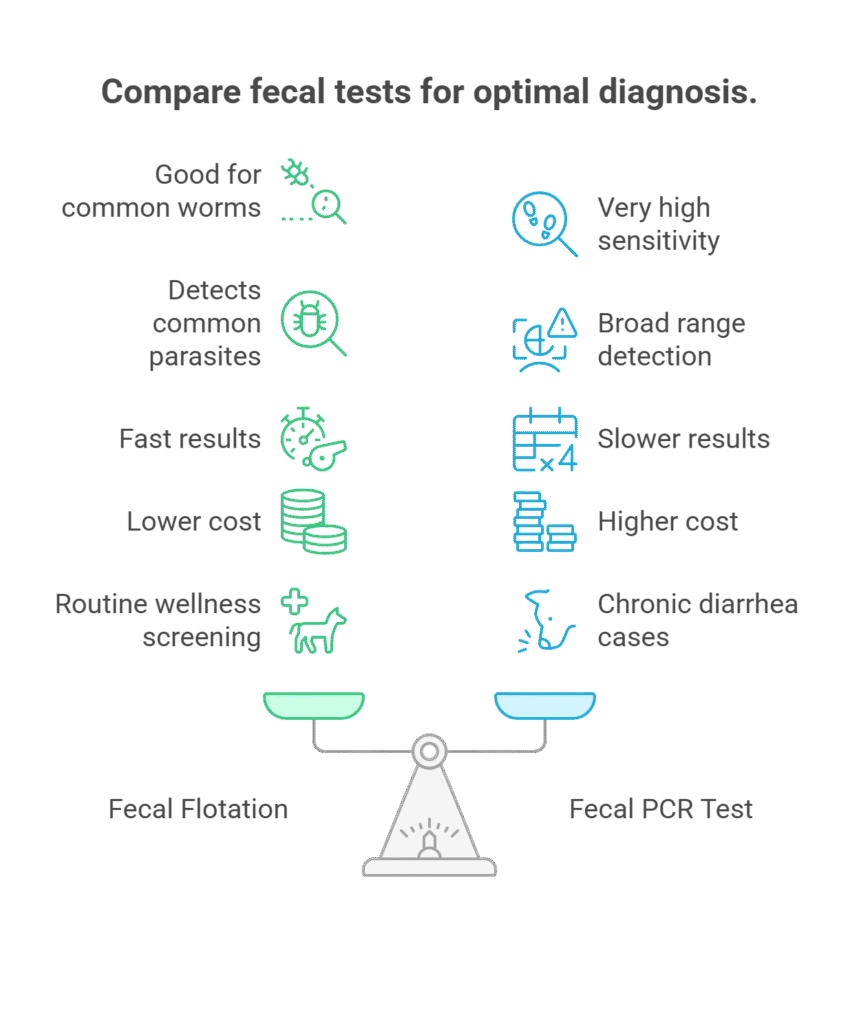
When Does Your Vet Choose One Over the Other?
As a veterinarian, my diagnostic choice is guided by the specific situation, clinical signs, and principles outlined in core veterinary texts like Blackwell’s Five-Minute Veterinary Consult: Canine and Feline. Modern veterinary medicine, as highlighted in comprehensive reviews in journals such as Veterinary Clinics of North America, encourages a tiered approach.
Why We Still Rely on Fecal Flotations
For a healthy puppy or adult dog’s annual check-up, a fecal flotation is often the perfect tool. It’s quick, affordable, and highly effective for catching the most common worm infestations we see. If a dog has straightforward diarrhoea and we find hookworm eggs on a float, we have our answer and can start treatment immediately without the extra cost or wait time of a fecal PCR test for dogs.
When a Fecal PCR Test for Dogs is the Unbeatable Choice
The fecal PCR test for dogs becomes our go-to diagnostic in more frustrating or complex cases. I recently treated a lovely Beagle mix from the Glebe with intermittent diarrhoea that had been going on for months. We had run three separate fecal floats over that time, and all came back clean. The owner was getting discouraged, and the dog was clearly not feeling his best.
On a hunch, we sent a sample out for a fecal PCR test for dogs. The results came back two days later: positive for a specific strain of Giardia known to be tricky to detect. With a targeted treatment plan based on that definitive result, his diarrhea resolved within a week. In that case, the fecal PCR test for dogs was absolutely worth it; it saved us from more guesswork and got him on the fast track to recovery.
What’s the Cost in Canada? A Look at Your Vet Bill
Cost is a practical and important consideration for every pet owner. Prices can vary depending on your location in Canada and your specific veterinary clinic, but here is a general idea of what you can expect.
| Diagnostic Test | Typical Cost Range (CAD) |
| In-Clinic Fecal Flotation | $45 – $75 |
| Fecal PCR Test for Dogs (Parasite Panel) | $150 – $250+ |
The higher price of the fecal PCR test for dogs reflects the advanced technology and the cost of running the analysis at a specialised diagnostic laboratory.
Your 5-Minute At-Home Checklist for Collecting a Great Sample
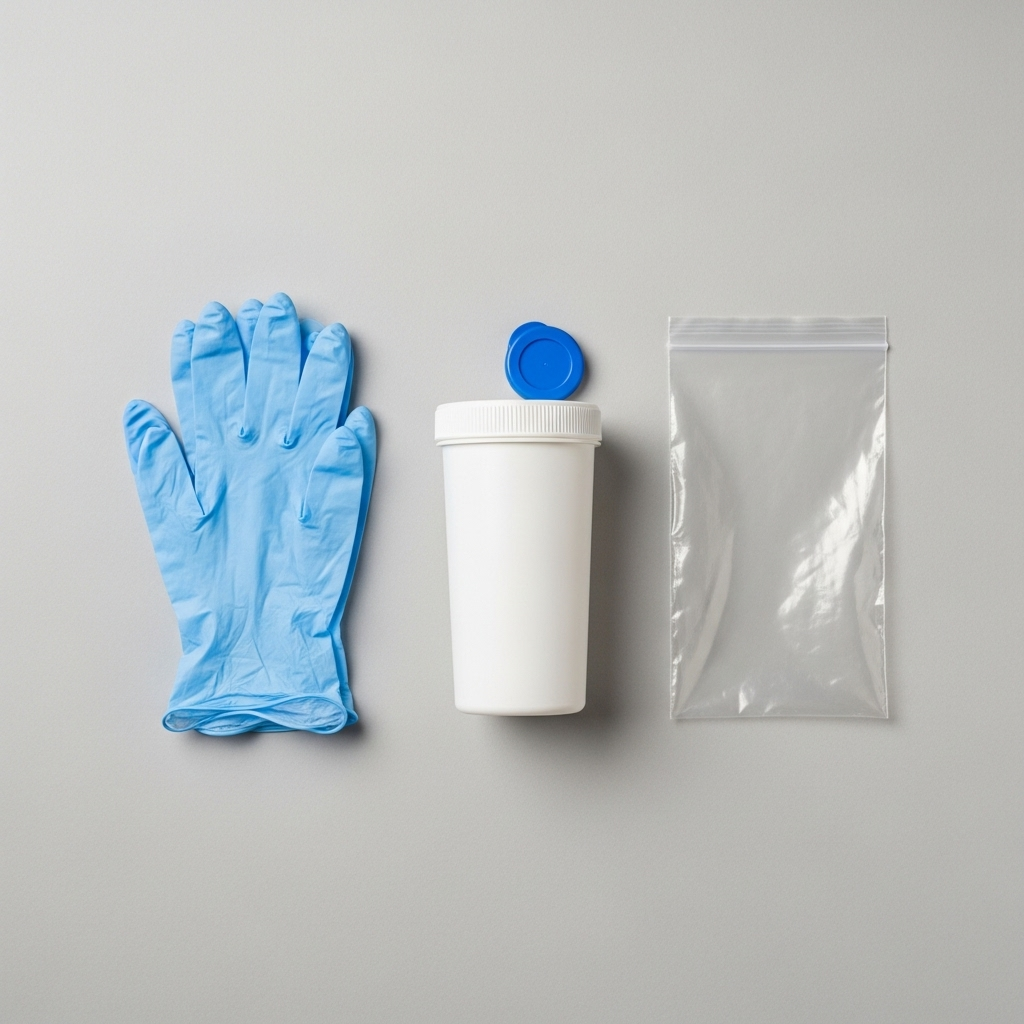
A test is only as good as the sample you provide! To get the most accurate result from either a float or a fecal PCR test for dogs, follow these simple steps.
- Freshness is Key: The sample should be as fresh as possible (ideally, less than 12 hours old). Don’t scrape an old, dry stool from the backyard.
- Get a Good Amount: Aim for a sample size of about a sugar cube. Your clinic will provide a small container.
- No Contaminants: Try to collect a “clean” part of the sample that hasn’t been sitting on grass, dirt, or kitty litter for a long time.
- Proper Storage: If you can’t bring it to the clinic immediately, double-bag it and store it in the refrigerator (never the freezer!). Clearly label the bag so no one mistakes it for food.
- Wash Your Hands: Always wear disposable gloves when collecting the sample and wash your hands thoroughly afterwards.
4 Simple Steps to Prevent Intestinal Parasites in Your Dog
Prevention is always the best medicine. Here’s how you can minimise the risk:
- Year-Round Prevention: Talk to your vet about a monthly parasite preventive medication. Many heartworm medications also protect against common intestinal worms.
- Pick Up Poop Promptly: Clean up your dog’s stool from your yard immediately. This prevents parasite eggs from contaminating the soil where your dog plays.
- Avoid Risky Areas: Be cautious around areas where many dogs congregate, like dog parks, especially if you see stool that hasn’t been picked up. Avoid letting your dog drink from standing puddles of water, which can harbour Giardia.
- Routine Vet Visits: Schedule an annual wellness exam that includes a fecal test, even if your dog seems perfectly healthy. This is the best way to catch infections early.
People Also Ask: Your Top Questions Answered
1. How often should my dog have a fecal test?
For most adult dogs, an annual fecal test during their wellness exam is sufficient. Puppies, who are at higher risk, need to be tested more frequently, typically at each of their vaccine appointments.
2. Can a fecal PCR test for dogs give a false negative?
While incredibly sensitive, no test is 100% perfect. A false negative is theoretically possible if the parasite DNA in the submitted sample is completely degraded or if the infection is located in a part of the intestine that isn’t being shed into the stool at that moment.
3. Why does my vet want to run both a float and a PCR test?
Sometimes, a vet may recommend both. A cost-effective in-house float can give a rapid answer for common worms. If it’s negative but the dog is still symptomatic, the sample might then be sent for a fecal PCR test for dogs to look for the more elusive organisms.
4. Is the fecal PCR test for dogs worth the extra money?
If your dog is healthy and it’s for a routine screen, a flotation is often all you need. But if your dog has been suffering from chronic digestive issues with no clear answer, the diagnostic power of the fecal PCR test for dogs is worth the investment to get a definitive diagnosis and the right treatment plan.
A Vet’s Final Thoughts: Partnering for a Healthy Gut
When your dog is sick, you want answers. Both the traditional fecal flotation and the modern fecal PCR test for dogs are fantastic tools that help us provide those answers. One isn’t universally “better” than the other; they are simply different tools for different jobs. Think of the fecal flotation as a trusted detective who is great at solving common cases, and the fecal PCR test for dogs as a forensic specialist called in for the toughest mysteries.
Your veterinarian is your partner in this. By listening to your observations and combining them with a physical exam and the right diagnostic test, we can work together to solve the puzzle, get your dog the right treatment, and see them back to their happy, tail-wagging self.

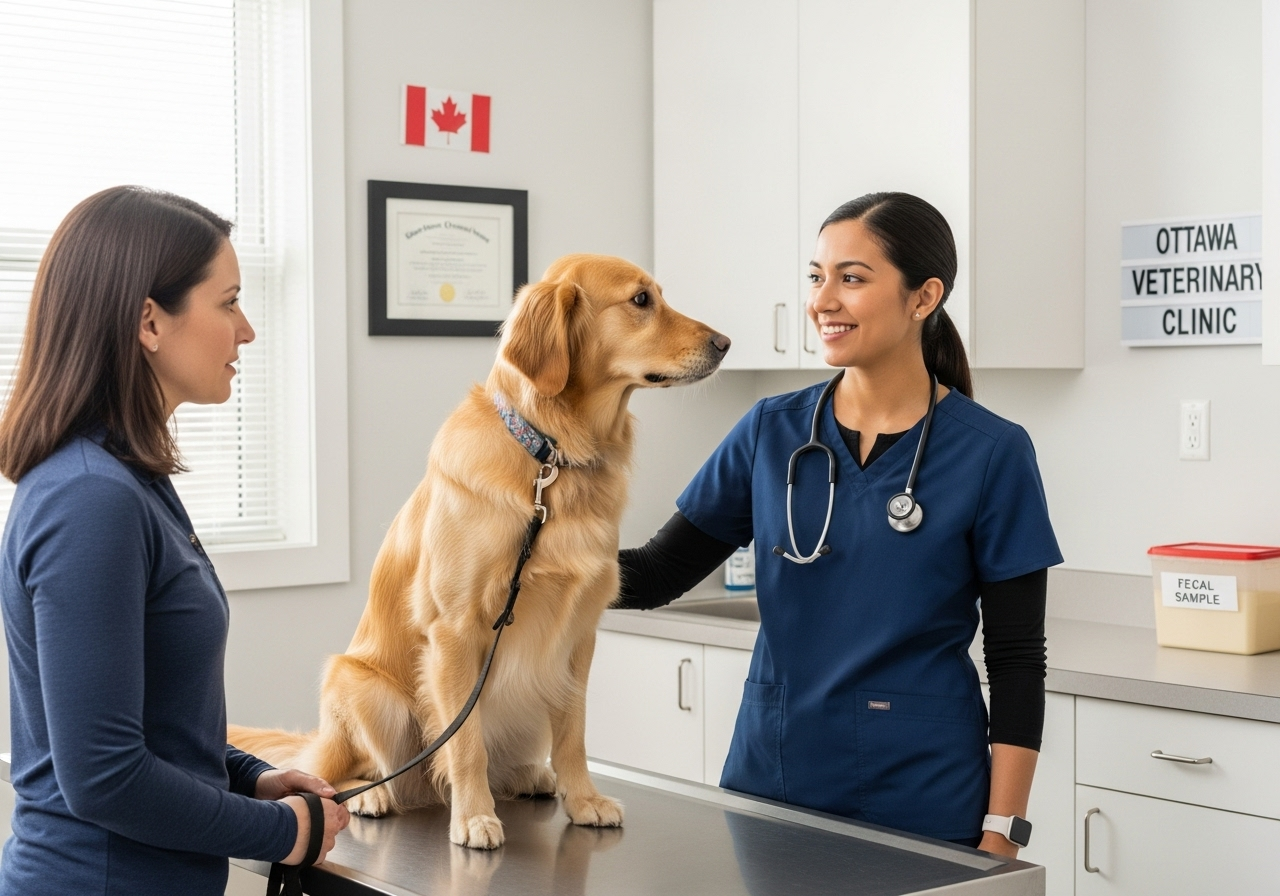



Pingback: Dog Barking at Night: 5 Proven & Gentle Methods